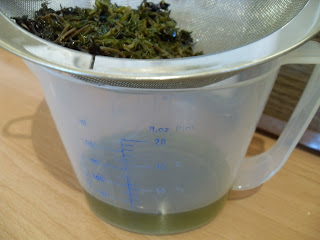In fact I left it until my other half got quite shirty about it hanging around the kitchen - he assumed it was for something to eat... mmm... not sure what recipe that would be. But he's well used to me dreaming up not only lotions and potions but interesting food recipes too!
Finally I sorted myself out and found the time to do something with it. I decided on a first aid balm because thyme is a wonderful antiseptic (and because I had no balm left in the cupboard). In fact I have a recipe for curing duck breasts in salt and thyme which clearly states that you cannot leave the thyme out because of it's antibacterial properties.
I strained the oil - for every 50ml you need 4gm of beeswax. Look how green the sunflower oil has gone, it smelled interesting too... very much as you would expect an antiseptic lotion to smell.
I then melted the beeswax until just a small lump remained unmelted and I took it off the heat and swirled it around until totally liquid. This beeswax was sent to me by a lady in Ireland who had won an award for the purity of her bees wax. It's very pale in colour and has the most delicate honey-like smell. You could use a more yellow bees wax if you want, the result will be the same, but of course the colour might be different. Then I added the strained oil and mixed it well.
Nothing else was required. No essential oils, nothing. Though you could add eo's if you want, I simply felt it was unnecessary.
I stirred it as it was cooling, speeding up the process by resting the pan in a large bowl of cold water. It was soon like a gloopy soup.
I then scraped it into a jar and gave it a good tap on the work surface to ensure no air pockets were trapped in the mixture.
I left it without the lid on until quite cold - you can get condensation inside the jar if you seal it up while still warm. Then I popped on the lid and put it in the first aid cupboard, where it didn't stay very long, a walk through the weeds at the allotment produced a nasty bite on my foot - not sure which/what insect did that but the thyme ointment took the itch away instantly and ensured that it wouldn't get infected. It's very satisfying using your own antiseptic balm.








Hmm .. I'm going to give this a try .. and i'm going to add lavender oil (or flowers) ... yes ... I have LOTS of bites ...
ReplyDeleteI love the simplicity of this. Unfortunately my thyme died last year for some reason, so I'll have to wait until my new plantings have matured before trying it.
ReplyDeleteThis comment has been removed by a blog administrator.
ReplyDeleteThis comment has been removed by a blog administrator.
ReplyDelete